Civil Network OPORA states that the voting process in Early Parliamentary Elections in Ukraine was regular and without incidents that could cast doubt on legitimacy of the election process. Taking into consideration the military operations on the East, 51.2% voter turnout (according to the results of parallel vote tabulation conducted by the OPORA, margin of error is not higher than 1.9%) is quite high, and shows that citizens are interested in political processes. The absolute majority of candidates had equal opportunities. However, campaigning in some districts of Donetsk and Luhansk oblasts was complicated by activities of illegal armed groups, supported by the regular army of the Russian Federation. Thus, we cannot say that the campaign was held freely on all territory of Ukraine. OPORA considers the decision of the CEC not to conduct voting in 15 single-mandate majoritarian election district (9 – Donetsk oblast, 6 – Luhansk oblast) was quite reasonable. As long as Ukrainian government has no control over these territories, it's impossible to conduct legitimate electoral process there.
On 26 October OPORA's observers reported the following violations at polling stations: attempts to give ballots without passport verification (12.9% polling stations), presence of unauthorized persons at polling stations (6.8%), attempts of illegitimate voting (6,3% of polls), attempts to take a ballot out of polling station (4.1%), violation of the voting secrecy (3,9%), taking picture of a ballot paper (2%), attempts of ballot box stuffing (1.8%), giving money and presents to the voters (1,5%). If we compare the dynamics and types of violations reported this year with those reported in 2012 regular elections, and 2013 re-election in 5 problematic districts, observers denote that controlled voting and fraud are less common. It means that the influence of administrative resource and voter bribery has decreased. Nevertheless, all incidents reported by observers and journalists should be investigated by law-enforcement bodies in order to punish the responsible and prevent such violations in the future.
OPORA's observers are still working at district election commissions, watching procedural violations that occur when the protocols are transferred from PECs to DECs, whether members of PECs have PEC seals with them (which should be left at the polling place), or are trying to make changes to the protocols. Determination of voting results and activities of the DEC are watched by our observers. The results will be published right after the stage of receiving PEC protocols in DECs.
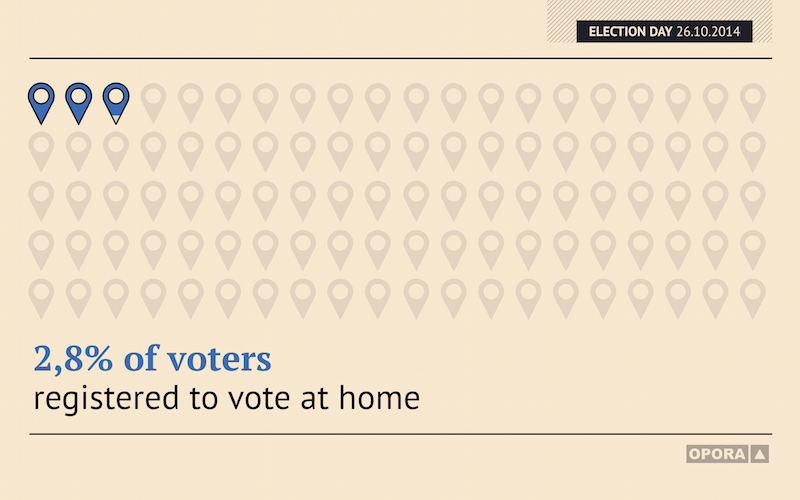
Typical violations, reported during the voting process and vote count
Observers of the Civil Network OPORA watched activities of precinct and district election commissions and adherence to the legislative procedures by all electoral subjects. OPORA secured comprehensive monitoring and reporting about violations noticed on the preparatory meetings of precinct election commissions and opening of polling stations, during the voting process, vote count in PECs and transference of documentation to DECs. All violations were generalized in statistics and classified according to the certain types.
Taking into consideration the number of incidents and abuses and their scale, we can say that electoral subjects didn't manage to fully adhere to electoral legislation. However, the reported violations were neither systematic nor planned, and cannot influence election results[1].
Preparatory meetings started at 7:15 AM at 20% of polls. However, according to the Law of Ukraine on Elections of People's Deputies of Ukraine, preparatory meetings should be held not earlier than 45 minutes before the voting begins. As a result, observers who came in time couldn't watch all election procedures, particularly opening of the safe with ballot papers, putting a control sheet, and sealing ballot boxes. Observers reported that the minutes of preparatory meeting were not made at 4.6% polling stations, what is a violation of the Article 35(2) of the Law. Almost all the precinct election commissions in the country conducted preparatory meetings, and gathered quorum (more than half of total commission membership). Besides that, despite there were some incidents when PEC stamps disappeared, they were not systematical.
[1] Summary doesn't include the stage of determining election results by district election commissions, which hasn't ended yet.
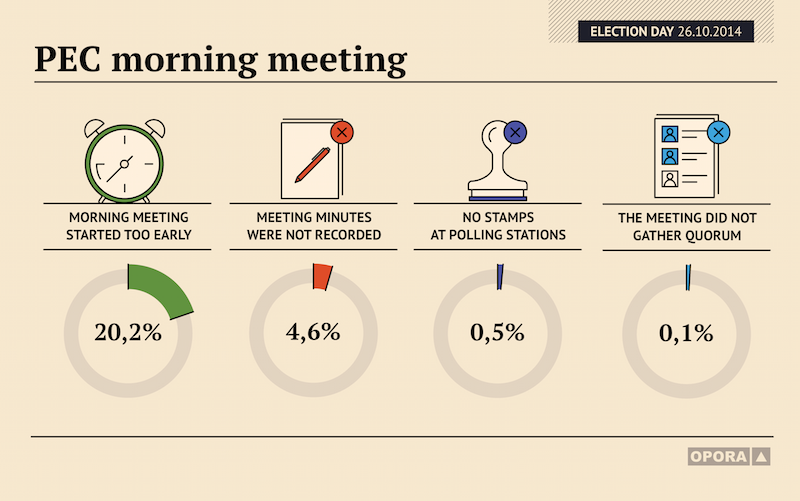
Polling stations were opened and the voting began in quite calm atmosphere, besides some notifications about mining of PECs in Mykolaiv, Rivne, and Kharkiv oblasts. At the same time, 17.2% were opened either earlier or later than the time established by the law (8:00 AM on 26 October). Such situations were usually caused by undue time management at PECs. Employees of the MIA, who were supposed to enforce the rule of law on the election day, were absent at 3.4% of polling stations when they were opening. Only 1 % of observers reported that PECs obstructed due observation of the election procedures.
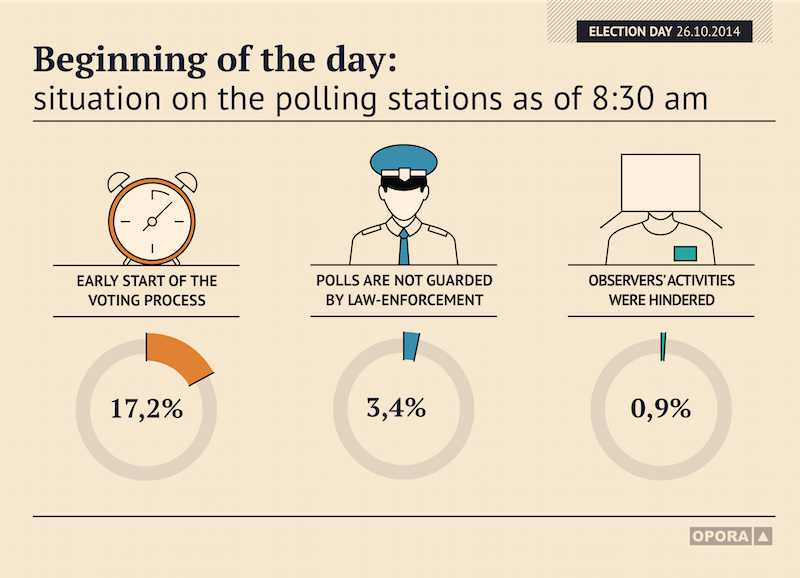
According to the data of Civil Network OPORA, 2.8% of voters registered to vote at home.
Civil Network OPORA assessed the dynamics of violations as of 12:00 PM, 4:00 PM, and 8:00 PM on the election day. In general, the number of reported violations wasn't high. However, typical violations were committed at every given time-interval. The most widespread violation reported by observers of the Civil Network OPORA on the election day was an attempt to issue a ballot paper without passport verification – detected at 12.9 % of polling stations. Despite such violations usually happened because commission members sincerely tried not to deprive the voters of their right to vote, every such incident is a direct violation of the Article 85(3) of the Law of Ukraine on Elections of People's Deputies of Ukraine.
At 6.8 % of polling stations, observers reported unauthorized persons present, what is against the Article 34(2) of the Law. According to the Law, members of election commissions, MP candidates and their proxies, the parties’ authorized persons, the official observers, and mass media representatives can be present at a polling station. For example, officials of state authorities and local self-government bodies, as well as unauthorized persons were noticed in the certain PECs within short time periods.
The violations related to attempts of illegitimate voting, when commission members tried to hand out ballot papers despite the data in voter list was different from passport data, or they were not included in the voter list, were quite noticeable. Such incidents were reported in 6.3 % of polls.
At 4.1 % of polling stations, OPORA's observers reported incidents when voters were trying to take ballots out of polls. Such violation can be a part of the carousel voting technology, the intentional falsification of voting results. At attempt to give a ballot to another person is a criminal offense (Article 160(1) of the Criminal Code of Ukraine). The maximal punishment for such offense is corrective labor for up to two years or restriction of liberty for the same period. In most reported incidents observers and law-enforcement officers managed to stop individuals who tried to take ballot papers out of polls.
Violation of the voting secrecy was reported at 3.9% of polling stations. At 2% of polling stations, voters took pictures of ballots after voting. Deliberate violation of the voting secrecy, when choice of a voter is intentionally disclosed, is a criminal offense and shall be punished with a fine or corrective labor for up to two years, or restriction of liberty for up to three years (Article 159(1) of the CrCU).
Other violations reported by observers (i.e. ballot box stuffing, giving money or presents to the voters) occurred rarely and cannot have significant influence on the election results.
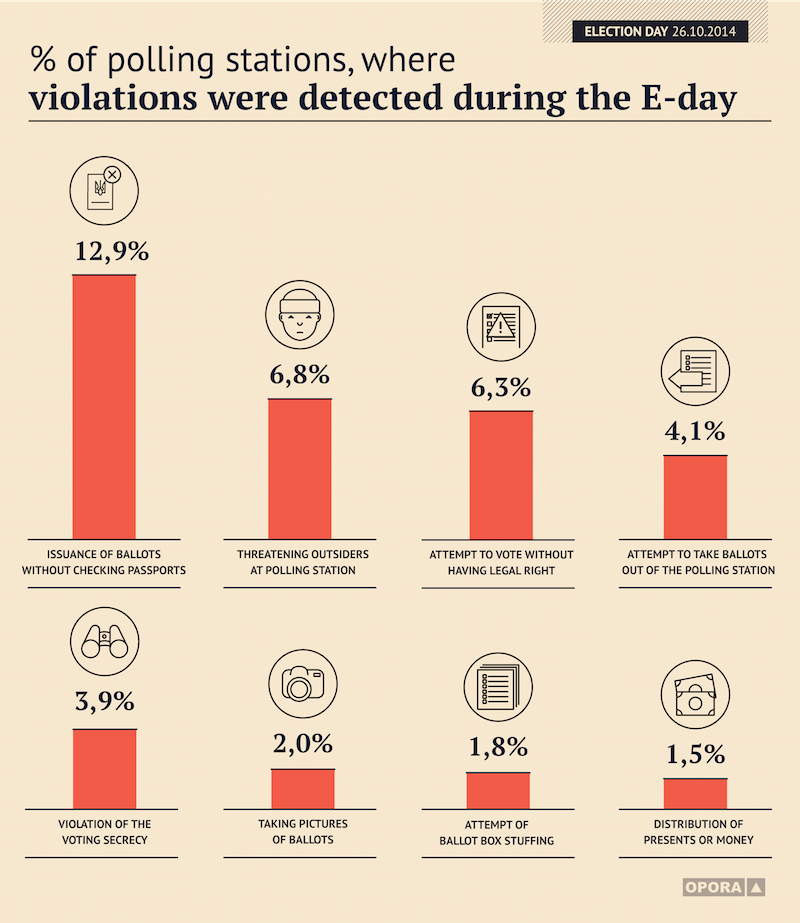
Voter turnout on the Election Day (calculated by the OPORA)
Under the observation campaign, Civil Network OPORA conducted the parallel turnout tabulation. The data were gathered from polling stations where OPORA deployed its official observers at 12:00 PM, 4:00 PM, and 8:00 PM.
The turnout in Early parliamentary elections is 51.7 %. If we take activeness of the voters in oblasts, the biggest number of citizens voted in western Ukraine as of 8:00 PM (Lviv, Ivano-Frankivsk, Zakarpattia, Ternopil, Khmelnytsk, Rivne, Volyn, Chernivtsi oblasts) and in the center (Vinnytsia, Zhytomyr, Cherkasy, Dnipropetrovsk, Kyiv, Kirovohrad oblasts and Kyiv city) – 59.7 and 55.1% respectively. The southern part of the country was less active (Odesa, Kherson, Mykolaiv, and Zaporizhia oblasts) – 42,4%. Voter turnout in the east (Donetsk, Kharkiv, Luhansk, and Dnipropetrovsk oblasts), were the atmosphere was quite tense, is 41.1%.
Similarly to the Parliamentary election in May, the dynamics of voting was changing during the voting day. The central Ukraine was voting more actively until midday, and the western part of the country was voting mostly after midday.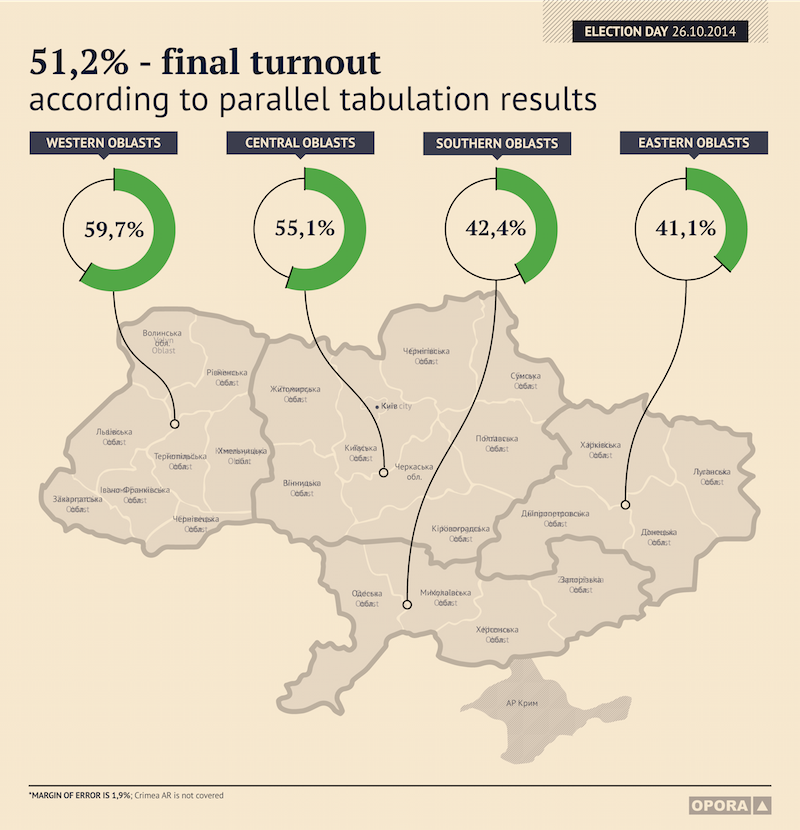
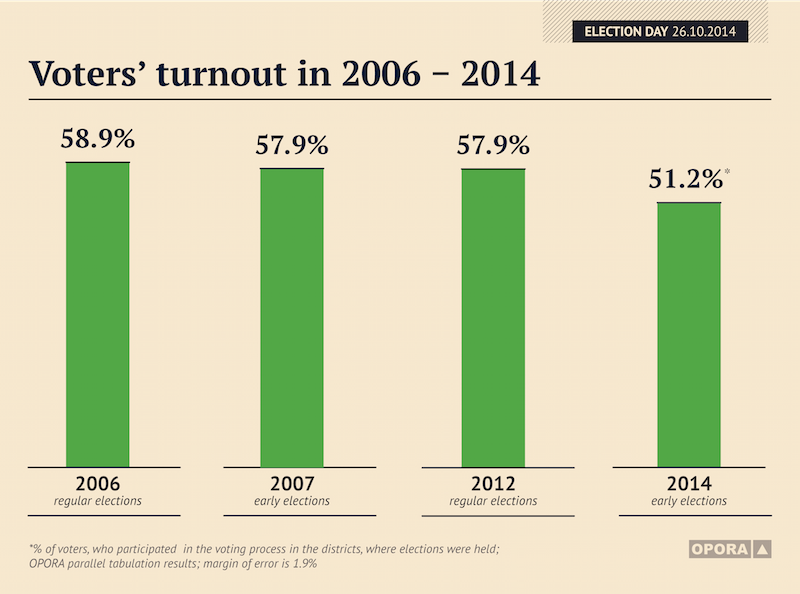
|
Macro region |
Turnout as of 12:00 PM |
Turnout as of 4:00 PM |
Turnout as of 8:00 PM |
|
Event |
19.5% |
46.1% |
59.7 % |
|
Center |
23.6% |
43.9 % |
55.1 % |
|
South |
20%. |
34.6 % |
42.2 % |
|
East |
18.1% |
32.6% |
41.1 % |
|
All Ukraine |
20.6% |
40.6% |
51.2% |
In general, the voter turnout is slightly lower in comparison with the last parliamentary elections. Voter turnout in 2012 Parliamentary elections was 57.9%. Such difference is, first of all, due to the impossibility to secure free and safe voting process on the whole territory of Donetsk and Luhansk obalsts.
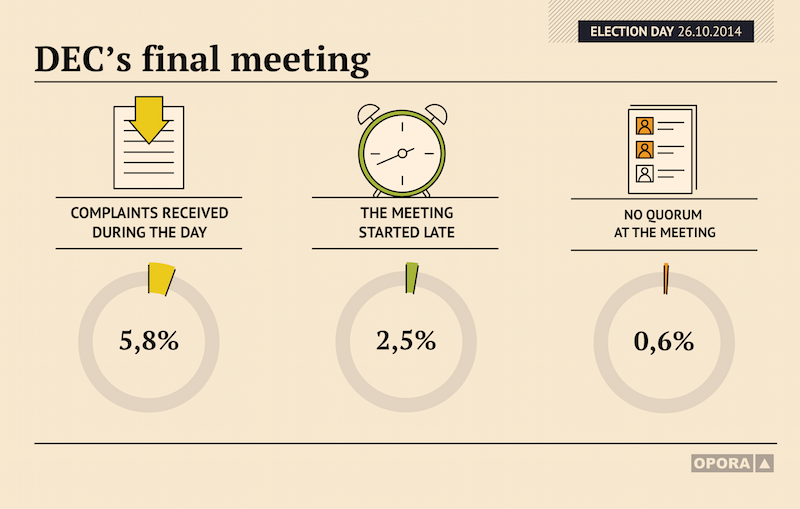
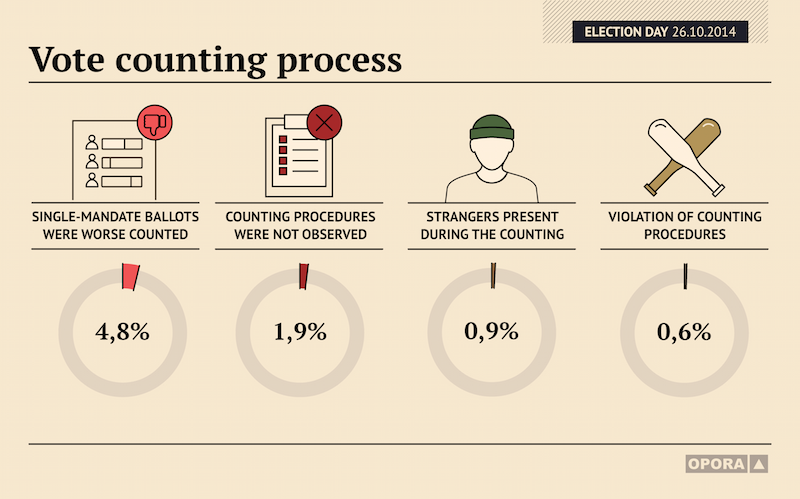
Voting process in Donetsk and Luhansk oblasts
The Verkhovna Rada of Ukraine failed to adjust the legislation to regulate the election process in Donetsk and Luhansk oblasts. As a result, election administration bodies faced the certain difficulties when trying to secure basic electoral standards in some districts of these unstable oblasts. The absence of special procedure for realization of citizen voting rights on problematic territories caused a number of organizational, political and legal issues.
As long as there was no decision about format of election commission activities and possibility of opening polling stations in districts that are partly controlled by illegal armed groups or located in so-called close to the front line zone, rights and authorities of electoral subjects were partly limited. According to OPORA's assessment, the rights of electoral subjects, including rights of official observers from NGOs to watch major election procedures or take part in them, were not secured in SMD #45 (cities of Avdiivka and Yasynuvata, Kyivskyi district of Donetsk city, and Yasynuvata raion), #52 (cities of Debaltseve and Dzherzhynsk, and Kalininskyi raion of the city of Horlivka), #53 (cities of Yenakiive, Vuhlehirsk and Torez in Donetsk oblast). The CEC had changed location of the DEC #45 twice. Besides that, this election commission was located in the center of another election district at the last stage of election process – in the city of Sloviansk. According to observers, unregulated activities of election commissions in problematic districts and their insufficient information support caused violation of the equal opportunities principle for parties and candidates in formation of PECs, registration of official observers, reporting about violations of election legislation etc. Besides that, safety issues and problems in organization affected campaigning opportunities and, as a result, competitiveness of the election process. Therefore, OPORA calls the CEC, law enforcement bodies, and electoral subjects to objectively consider the course of electoral process in SMDs #45, 52, and 53 (Donetsk obl.), including consideration of election controversy in the court to determine objective circumstances of the voting process in these districts.
As a result of non-public activities of DECs and inactivity of the CEC concerning the certain aspects of election administration in Donetsk and Luhansk oblasts, electoral subjects didn't have full information about real boundaries of single-member districts that were de-facto changed due to active hostilities. Besides that, information about the number of election districts where Ukrainian citizens can vote wasn't published in time. Such situation occurred in SMD #45, 52, 53, 59, 60 (Donetsk obl.), and 106, 107, 112 (Luhansk obl.). Thus, opportunities of candidates to conduct election campaigning and/or exercise other voting rights were limited. At the same time, small number of polling stations opened in problematic districts caused a de-facto deviation from the regular number of voters in a single-mandate district.
OPORA's observers reported incidents at SMDs #45, 50, 59, and 60 with armed people involved, probably representatives of law-enforcement bodies, who caused grave violations of electoral legislation. There were also incidents of ballot box stuffing or attempts of ballot box stuffing.
Taking into consideration the abovementioned, OPORA calls the CEC, law enforcement bodies, and electoral subjects to objectively consider the course of electoral process in SMDs #45, 52, and 53 (Donetsk obl.) to determine objective circumstances of the voting process in these districts.
Civil Network OPORA conducts a wide-scale monitoring of Early Parliamentary Elections in Ukraine scheduled for 26 October 2014. The organization attracted 213 long-term observers (1 in each single-member district) and 2,000 short-term observers, which will conduct parallel vote tabulation based on statistical sample for the proportional part of the election system. OPORA systematically informs the public about the course of election campaign, and whether electoral subjects adhere to the electoral legislation, officials participate in the race, and all the interested parties follow international standards. Large-scale civic observation is aimed to prevent violations during the election campaign and abuses during the vote count process.
OPORA's summary is based on the results of long- and short-term observation, criteria and principles of democratic elections established by documents of the Venice Commission, Copenhagen Conference, and the Organization for Security and Co-operation in Europe (OSCE). OPORA's observers adhered to the Declaration of Global Principles for Nonpartisan Election Observation and Monitoring by Citizen Organizations (GNDEM http://www.gndem.org/ru/dogp_ru)